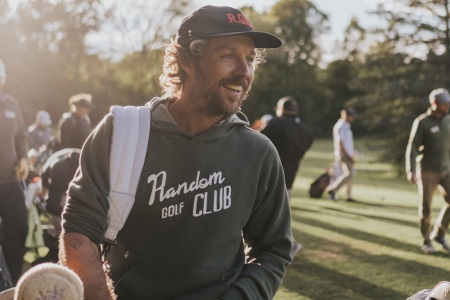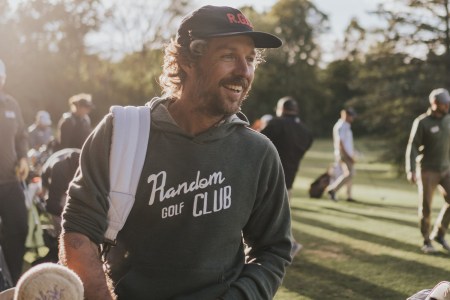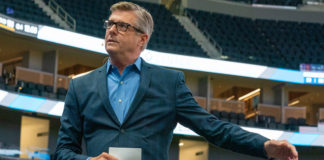Some writers have an encyclopedic knowledge of all things sports; others have a penchant for humor. These two areas might seem far removed from one another, but for certain writers, they mesh together perfectly. Case in point: Jason Gay, who by day is the Sports and Humor Columnist for the The Wall Street Journal. His previous book, Little Victories: A Sportswriter’s Notes on Winning at Life, was a finalist for the 2016 Thurber Prize, awarded each year to a notable work of humor.
Gay’s new book, I Wouldn’t Do That If I Were Me: Modern Blunders and Modest Triumphs (But Mostly Blunders), covers a wide range of sports-related topics, from little league to the Daytona 500. And there’s the essay excerpted here, the title of which — “Very Bad at Golf” — gives a sense of what you can expect. Like many people, Gay embraced golf in the early days of the pandemic. Few other golfers, however, had quite the take on it that he does.
Very Bad at Golf
During the shutdown months, I made the terrible mistake of playing more golf, a sport invented for the grim purpose of torturing psyches and making otherwise well-balanced people miserable. I’m not alone in making this mistake: golf is up, way up, as an activity since everything went sideways in March 2020.
Before then, golf courses were flailing, begging you to come play, to the point the recreational sport was considered to be in the early stages of a death spiral. Golf was out of sync with modern lives; it was too time-consuming, costly, and hard. This remains true: golf is too time-consuming, costly, and hard. But it is also played outside, and it is socially distant, and it is generally healthy, aside from the fact that it makes humans miserable.
All of a sudden, folks who would never otherwise play golf were making the terrible mistake of playing golf. Places that once begged you to come play on their empty courses were now laughing on the other end of the phone, telling you to call back next month. This became yet another reason to hate golf.
Don’t get the wrong idea: I love golf. I truly do. I’m as prone to its seductions as anyone else. There are a few days (or hours) every year when I hit the ball crisply and straight, and I delude myself, momentarily, that this is an activity I enjoy. I get very excited, purchase two collared shirts with stripes at a pro shop, and practice my swing in the kitchen when I really should be making school lunches. I develop opinions on putters. For a few weeks, as I keep hitting them straight, I think I’m on the verge of a breakthrough.
This is nonsense. This is golf being wicked. I am not on the verge of a breakthrough. I am another soul-crushing golf calamity about to happen, and honestly, the sooner that happens, the better, because what I really should do is drive straight to a bridge overlooking the ocean and drop my golf clubs to the bottom of the deep.
When I feel it start to slip away, I try to enlist the services of a professional. For a fee that ranges from reasonable to “are you kidding me,” you can get yourself a skilled instructor who will stand next to you for forty-five minutes, watch you swing a club, and try not to laugh. At 8:00 a.m., this instructor had a malpractice lawyer with a terrible slice, and at 10:00 a.m., this instructor has a graduate student who’s about to go on a bachelor party to Scotland, but here, at 9:00 a.m., this instructor has me, a writer under the impression his swing is not embarrassing. Of course it is embarrassing. It looks like someone trying to swat crickets out of the basement. Salvaging this stroke would require a full team of instructors and a commitment of decades. The instructor knows the only good advice for me is to drive straight to a bridge overlooking the ocean and drop my golf clubs to the bottom of the deep.
Still, to be polite, they will stand there and slowly point out what I am doing wrong, which is everything. Maybe change your grip. Maybe move your feet. Watch your front arm. Watch your back arm. Point your head down. Getting a lesson with a good instructor is like standing in a dressing room with a stylist and having them say, politely, gradually, that the only thing they would change are the shoes, the socks, the pants, the belt, the shirt, and the jacket, and probably the hair. That’s it. Other than that, everything’s looking pretty good. Wouldn’t change a thing.
It’s healthy to get broken down like this, I believe. As we age, adults get resistant to advice, because we get set in our ways and become too sensitive about being told that we are bad chefs, or lousy drivers, or underwhelming spouses, or talk too loud at parties. With a golf swing, however, we will put ourselves at the mercy of an expert and ask them to strip us bare. The folly of it is that the thing that truly improves your golf is more golf — repeatedly practicing, practicing, practicing until the swing becomes not a series of embedded instructions but a single, fluid motion. Golf forces you to think, but the best golf looks like there’s no thinking happening at all.
I often play golf alone. This is not because I am a loner — well, it’s a little bit because of this — but it’s also because I find it enjoyable to get out there, bop along at my own pace, and soak in my own shame. If you play alone, you do not have to worry about arranging foursomes, and carts, and getting everyone to show up on time, and you don’t get sucked in to two hours of beers by the firepit afterward. The only downside of solo golf is you occasionally hit a great shot, and there’s no one there to witness it. That’s fine for me, because it really only happens two or three times a decade.
I do not belong to any sort of club. I am not club material; I can barely remember to renew my Costco and AAA memberships. I don’t want to pay money to go to a place with somebody else’s rules, like members’ hours, or having to wear shoes. I do not want a dress code. I want to play golf looking like I am about to grill sausage. I refuse to belong to a place that has Fussy Family Fridays and Wednesday marshmallow roasts and a disproportionate number of orthodontists named Brad. I don’t need a valet, a bartender, and a signature club drink. I can park my own car, even if Brad refuses.
The golf courses I frequent are the kind of places that have a clubhouse with a soda machine that dispenses Fanta and Busch, and a cat in the pro shop that may or may not have eyes. This clubhouse smells of Merit filtereds and sells a set of aluminum clubs that have been there since 1979. It has a very strict shoes-optional policy. A golf course like this tends to be a little shabby around the edges, which is perfect because I too am shabby around the edges. If you pick the right times, you can play a course like this for the cost of a cheesesteak and fries. Okay, maybe two cheesesteaks and fries.
Lately, the kids have been coming with me. At first, this was just a way of getting them out of the house at a time when they really needed to get out of the house, but now it’s because they are under the illusion they enjoy playing golf. If I was a good parent, I would take them to the ocean and drop their clubs in the deep. But no, I have to encourage them, because it is the parenting thing to do. The other day, I watched Jesse practicing his swing in the backyard, and I thought, Oh, no. I’m preparing him for a lifetime of misery.
Or maybe he winds up being one of those people who are preternaturally talented at golf, learns at an early enough age, and actually enjoys playing it. There are six people like that in the world.
Then there are golf tournaments — not for me and you, but the professionals, the pinnacle of which is the Masters, the annual conclave in Augusta, Georgia. The Masters is so hallowed that people actually start whispering about it, like they’re on the course when they’re not even there.
ME, TO FRIEND: What are you up to this weekend?
FRIEND: Oh, man. I’m watching [low voice, whispering] the Masters.
ME, TO FRIEND: Why are you whispering? We’re standing in a Target parking lot.
The Masters is most definitely a bucket-list ticket for sports fans, and it is a wild sensation to walk through those gates for the first time and see those azaleas and two-dollar pimento sandwiches and the men in green blazers who look like they should be firing someone from a petroleum company.
But it’s also a comically ersatz place where they paint the fairways’ blotches green, and once you walk out the gates, you’re four hundred steps from a circus of strip malls, discount motels, and fast-food joints. It’s something to consider the next time you hear someone whisper about the event like they’re sitting in a cathedral. If the Masters is a cathedral, it’s a cathedral with a Hooters next door.
If you stick with golf, inevitably you’re going to get sucked in to some kind of workplace golf event or foursome with strangers, and my best advice here is: fake being sick. I’m serious. When you pick up the phone, cough loudly and maybe play mortuary organ music, like Cameron in Ferris Bueller’s Day Off. If they ask if you’re okay, don’t answer; just leave the phone unanswered until they call for an ambulance, which is still better than playing golf.
You won’t do that, of course, because you’ve fallen into the trap that every golfer falls into, which is thinking, Maybe it will be different this time. After years of shameless hacking, you’re going to suddenly show up to an afternoon corporate golf retreat and turn into the second coming of Tom Watson. You’re going to be landing on pillowy fairways and hitting greens in regulation and curling perfect birdie putts into the cup for high fives. Your group will be awestruck and ask you for golf tips. If the boss is there, you might be in line for a raise.
This is not what happens, of course, because golf is…golf. You’re going to show up at that first tee, and your first drive is going to sail straight into the woods. Everyone will chuckle a bit, and someone will throw you a second ball and tell you to take a mulligan, and you’ll then hit that second ball straight into the woods too. I have personally done this routine so many times, to the point it should be named after me.
The good news is that once you’ve established you have no idea what you’re doing, your playing partners will cross you off as a threat, and the pressure will be off. Your partner will stop writing down your strokes on the scorecard. Once in a while, you will stripe a drive dead straight, or chip in for bogey, and you’ll get some charity applause, like you’re a dog that just opened a beer can. The other good news is that you’re only going to be out there for five to five and a half more hours to play eighteen holes.
Moments like this — and I have had them — make a person question why they ever took up a sport as cosmically punishing as golf, and this is something I’ve thought a lot about over the years while being cosmically punished by golf.
I think it’s because few difficult activities offer a comparable emotional roller coaster, veering from bleak misery to lucky, life-affirming joy, sometimes in the space of seconds. That kind of veering can get addictive and make you feel that as bad as it gets, something better is always around the corner, which, if you think about it, is a rather upbeat and admirable way to live. But it’s not. It’s really not. I really do like to play golf, and I don’t see myself stopping. I also need to drive straight to a bridge overlooking the ocean and drop my golf clubs to the bottom of the deep.
Excerpted from I Wouldn’t Do That If I Were Me: Modern Blunders and Modest Triumphs (but Mostly Blunders) by Jason Gay. Copyright © 2022. Available from Hachette Books, an imprint of Hachette Book Group, Inc.
This article was featured in the InsideHook newsletter. Sign up now.








